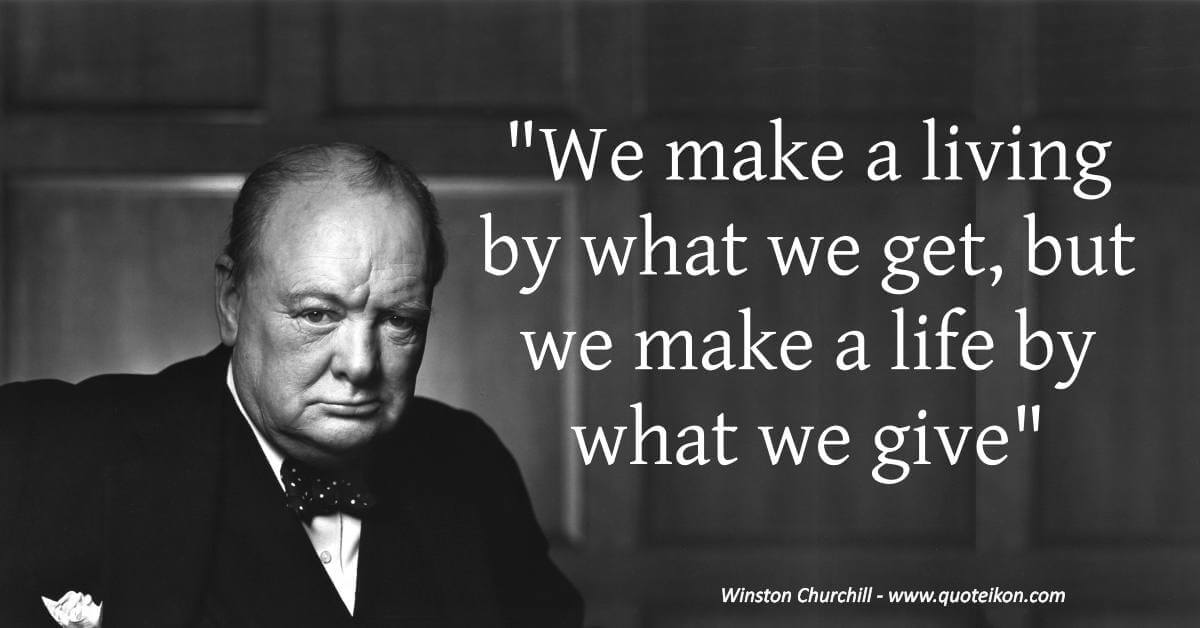

“If We Must Die” can be seen as a kind of spiritual successor to Alfred, Lord Tennyson’s “The Charge of the Light Brigade”. The idea that good people should not stand by as evil threatens to overtake everything is a powerful one, and McKay’s words are inspiring to anyone who feels powerless against a greater force. The poem has a bit of the stiff upper lip nobility that England exported to all of its colonies, including McKay’s birth country of Jamaica. He is writing in a deliberately British mode and uses the Shakespearian sonnet form to connect his vision of black masculinity to the “heroic sentimentalism of Victorian England” (Cooper, 100). Part of these stories’ enduring popularity comes from McKay’s own style and substance.
#Winston churchill dont quit poem archive#
Why, then, does the legend prevail? How does this poem enact Peter Middleton’s “long biography,” “the aggregative textual archive that composes the textual memory of the poem, its showing in magazines, performance, anthologies, its construal in reviews and commentaries and other treatments” (23)? No reference can be found in Hansard or the Congressional Record or The Churchill Centre” (33). Jenkins saying, “In fact, there is no evidence that Churchill cited the poem in any speech. David Freeman abstracts an article by Lee M. The problem is, however, that there is no record of either version of this story happening. In either story the power of McKay’s words, written in a time of race riots and civil tensions, is said to transcend their original meaning and become a rallying cry for the greater cause of good versus evil. The second version has Churchill quoting it in an address to his own countrymen during World War II at the House of Commons. The first posits that Churchill quoted McKay’s “ If We Must Die” to the United States Congress in order to spur the country into joining World War II. There is a story which connects Harlem Renaissance poet Claude McKay to British Prime Minister Winston Churchill. Early Uncollected Poetry (1911-1922) Uncollected Poems by Claude McKay published in Jamaican, British, and American magazines Workers Dreadnought Poetry Spring in New Hampshire (1920): Digital Edition Harlem Shadows (1922): Digital Edition Harlem Shadows Digital Edition Selected Poems of Claude McKay (1953) Approximating the Table of Contents of "Selected Poems of Claude McKay" Criticism and Contextual Essays Works Cited Works Cited for "Claude McKay's Early Poetry (1912-1922)" TEI/XML Editions (in progress/coming soon) Links to TEI versions of these texts Amardeep Singh c185e79df2fca428277052b90841c4aba30044e1 "If We Must Die" in England 1 T07:25:26-05:00 Amardeep Singh c185e79df2fca428277052b90841c4aba30044e1 69 2 Contextual Essay. Claude McKay's Early Poetry (1911-1922) : A Digital Collection Main Menu Introduction: About this Site Amardeep Singh, Lehigh University Constab Ballads (1912) - Digital Edition Claude McKay's "Constab Ballads" Songs of Jamaica (1912): Digital Edition Book of poetry by Claude McKay. Please enable Javascript and reload the page. It’s when things seem worst that you mustn’t quit.This site requires Javascript to be turned on. So stick to the fight when you’re hardest hit,

When he might have won if he’d stuck it out,ĭon’t give up though the pace seems slow,Īnd he learned too late, when the night slipped down,Īnd you never can tell how close you are, When the funds are low and debts are high,


When the road you’re trudging seems all uphill, When Things go wrong, as they sometimes will, “Tell me,” the sponsor said, “who is your instructor? He must be a great master.” The student later became known as the great performer Koshiji. Despite the student’s embarrassed objections, the sponsor refused to believe that he had just heard a beginner perform. When he had finished, the sponsor of the contest highly praised his performance.


 0 kommentar(er)
0 kommentar(er)
